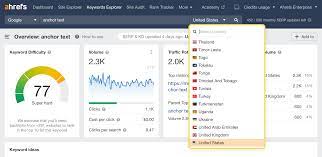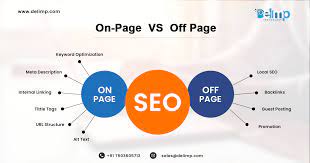The Power of Off-Page Optimization in SEO
When it comes to Search Engine Optimization (SEO), off-page optimization plays a crucial role in determining the visibility and ranking of a website on search engine results pages. While on-page factors such as content quality and keyword optimization are essential, off-page optimization focuses on external factors that can influence a site’s authority and relevance.
What is Off-Page Optimization?
Off-page optimization refers to all the activities that take place outside of your website but have an impact on its search engine rankings. This includes link building, social media marketing, influencer outreach, and online reputation management. The goal of off-page optimization is to increase your site’s credibility, trustworthiness, and popularity in the eyes of both users and search engines.
The Importance of Off-Page Optimization
Off-page optimization is essential for several reasons:
- Backlinks: High-quality backlinks from authoritative websites signal to search engines that your site is trustworthy and relevant.
- Brand Awareness: By engaging in off-page activities such as social media marketing and influencer collaborations, you can increase brand visibility and attract more traffic to your site.
- Reputation Management: Monitoring and managing online reviews, mentions, and comments can help build a positive online reputation for your brand.
- Competitive Advantage: Effective off-page optimization strategies can give you a competitive edge by improving your site’s visibility and ranking compared to competitors.
Key Off-Page Optimization Techniques
Some key techniques used in off-page optimization include:
- Link Building: Acquiring high-quality backlinks from reputable sites through guest posting, outreach campaigns, and content partnerships.
- Social Media Marketing: Engaging with users on social media platforms to promote content, drive traffic, and build brand awareness.
- Influencer Outreach: Collaborating with influencers or industry experts to reach a wider audience and gain credibility within your niche.
- Online Reputation Management: Monitoring online mentions of your brand and actively addressing any negative feedback or reviews to maintain a positive reputation.
In Conclusion
In conclusion, off-page optimization is a vital component of any comprehensive SEO strategy. By implementing effective off-page techniques such as link building, social media marketing, and reputation management, you can enhance your site’s authority, relevance, and visibility in search engine results. Remember that building a strong off-page presence takes time and effort but can yield significant long-term benefits for your website’s SEO performance.
Understanding Off-Page Optimisation: Key FAQs and Insights
- Which of the following is an example of off-page optimization?
- What are the five most important off-page optimization factors?
- Why do we need off-page optimization?
- What is off-page optimization examples?
- How do I use off-page optimization for my website?
- What is on page optimization example?
Which of the following is an example of off-page optimization?
An example of off-page optimization is link building. Link building involves acquiring backlinks from external websites to your own site. These backlinks act as a vote of confidence in the quality and relevance of your content, helping to improve your site’s authority and visibility in search engine results. Other examples of off-page optimization include social media marketing, influencer outreach, and online reputation management, all of which focus on enhancing your website’s presence and credibility beyond its own pages.
What are the five most important off-page optimization factors?
When it comes to off-page optimization, there are five key factors that play a significant role in enhancing a website’s SEO performance. Firstly, backlinks from authoritative and relevant websites are crucial for building credibility and trust with search engines. Social signals, such as likes, shares, and comments on social media platforms, also contribute to a site’s visibility and engagement. Quality content that attracts natural links and mentions from other sites is another vital factor in off-page optimization. Online reputation management, including monitoring reviews and responding to feedback, helps maintain a positive brand image. Lastly, diversity in link sources and anchor text usage ensures a natural link profile that search engines favour. Mastering these five factors can greatly boost a website’s off-page SEO efforts and overall online presence.
Why do we need off-page optimization?
Off-page optimization is essential in the realm of SEO because it focuses on external factors that can significantly impact a website’s visibility and ranking on search engine results pages. By engaging in off-page activities such as link building, social media marketing, influencer outreach, and online reputation management, websites can enhance their credibility, trustworthiness, and authority in the eyes of both users and search engines. These efforts not only help drive more traffic to the site but also improve brand awareness, online reputation, and competitive advantage. In essence, off-page optimization is crucial for building a strong online presence and staying ahead in the ever-evolving digital landscape.
What is off-page optimization examples?
Off-page optimization examples encompass a range of strategies that focus on enhancing a website’s external credibility and authority. Some common examples include link building, where websites acquire backlinks from reputable sources to boost their search engine rankings. Social media marketing is another key example, involving the promotion of content and engagement with users on platforms like Facebook, Twitter, and Instagram to increase brand visibility. Additionally, influencer outreach is a popular off-page technique where collaborations with industry experts or influencers help expand a website’s reach and credibility within its niche. These examples illustrate how off-page optimization plays a crucial role in improving a website’s online presence and search engine performance.
How do I use off-page optimization for my website?
To effectively utilise off-page optimization for your website, it is crucial to focus on building a strong online presence through various strategies. Start by prioritising link building, acquiring high-quality backlinks from reputable websites within your industry. Engage in social media marketing to promote your content and interact with your audience on platforms where they are active. Consider collaborating with influencers or industry experts to expand your reach and credibility. Monitor and manage your online reputation by responding to reviews and mentions to maintain a positive image. By implementing these off-page optimization techniques consistently and strategically, you can enhance your website’s authority, visibility, and ranking in search engine results.
What is on page optimization example?
On-page optimization refers to the strategies and techniques implemented directly on a website to improve its search engine visibility and ranking. An example of on-page optimization includes optimising meta tags such as title tags, meta descriptions, and heading tags with relevant keywords to enhance the site’s relevance to search queries. Additionally, creating high-quality and engaging content that is well-structured and keyword-rich is another key aspect of on-page optimization. By focusing on these on-page elements, website owners can make their sites more user-friendly and appealing to search engines, ultimately leading to better organic search rankings and increased visibility online.



